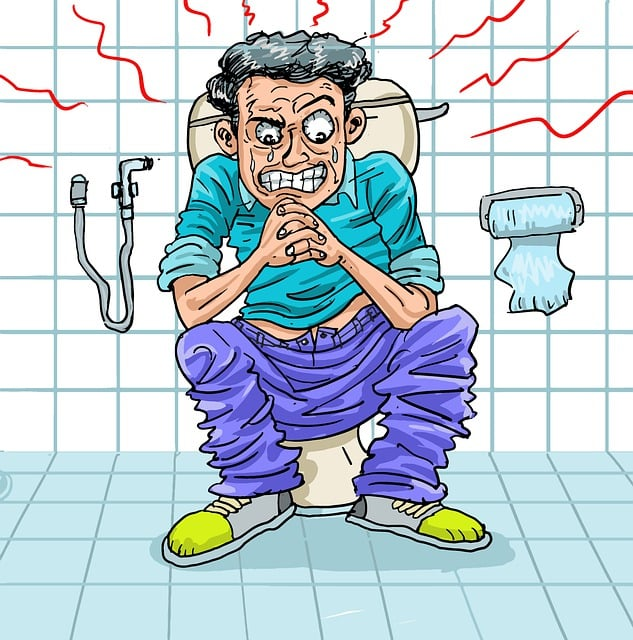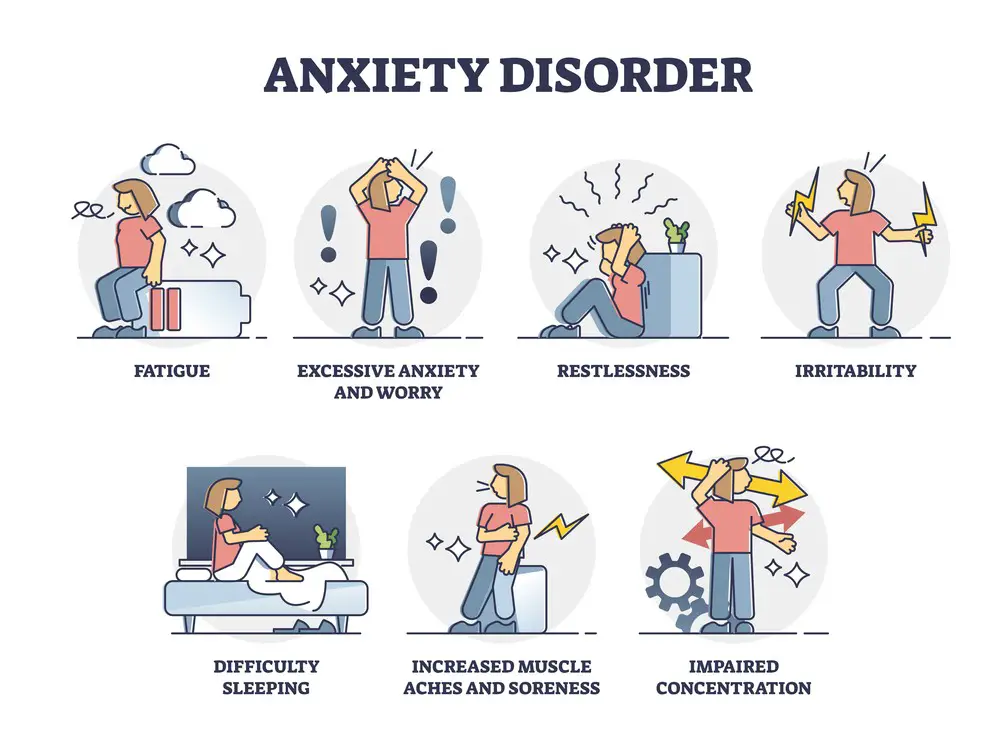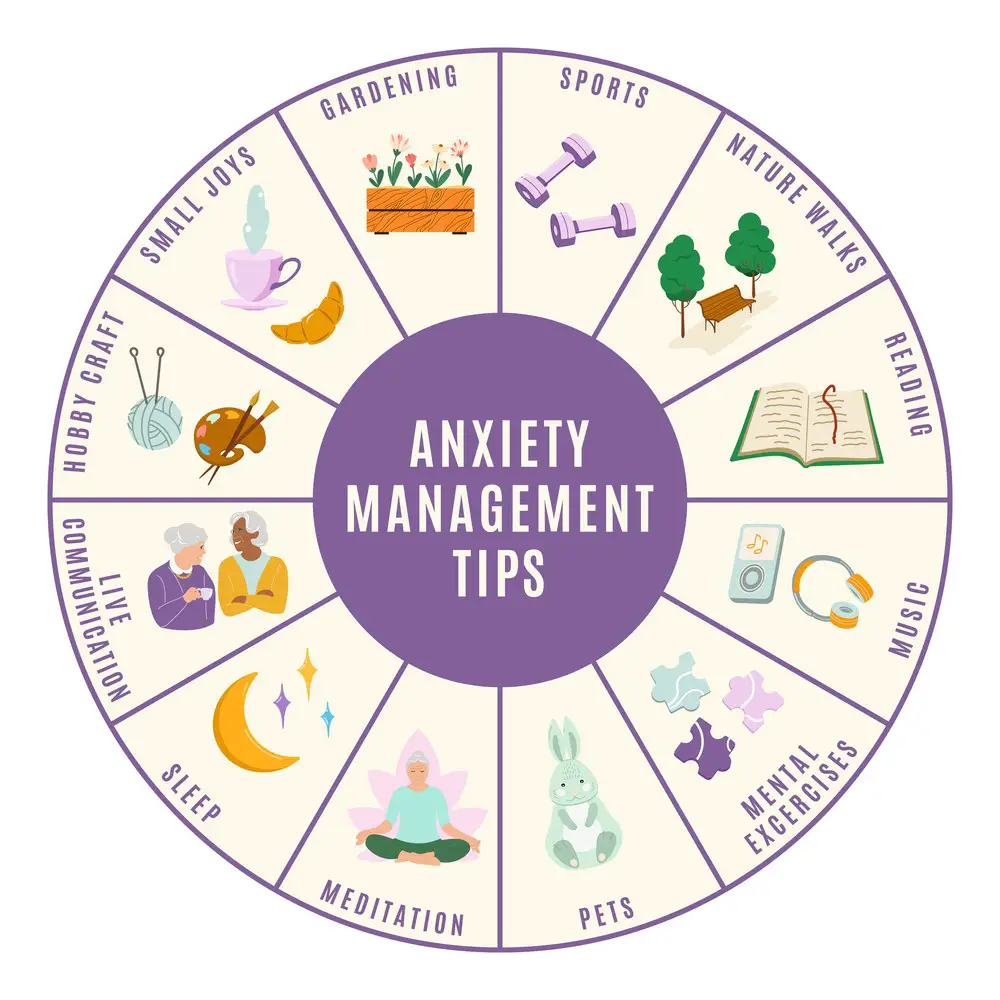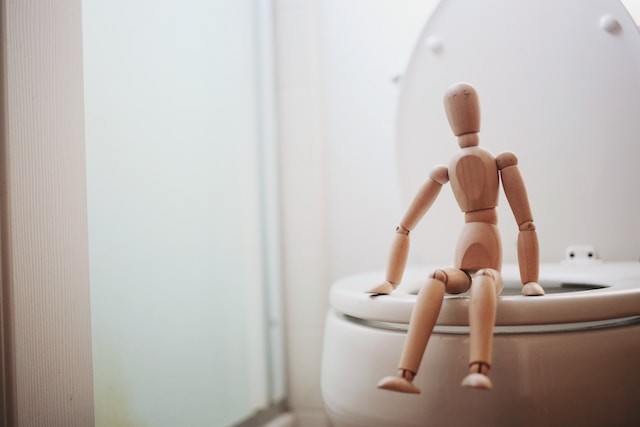As a BetterHelp affiliate, we receive compensation from BetterHelp if you purchase products or services through the links provided
If you’re dealing with both constipation and anxiety, you might wonder if these two are connected somehow. Indeed, they can be two sides of the same coin, influencing each other in a loop that’s hard to break. But here’s the good news: understanding this connection can empower you to manage both conditions more effectively. Here’s what we’re diving into:
- The scientific connection between constipation and anxiety
- How can one exacerbate the other
- Remedies and lifestyle changes that could make a difference for you
Understanding Constipation and Anxiety
What Is Constipation?
Constipation is a common gastrointestinal issue characterized by infrequent bowel movements or difficulty passing stools. It often involves hard, dry, or painful bowel movements and can lead to discomfort.

Causes and Symptoms
- Dietary Factors: A low-fiber diet, insufficient fluid intake, and inadequate consumption of fruits and vegetables can contribute to constipation. Fiber is crucial in adding bulk to the stool and facilitating its movement through the digestive tract.
- Lifestyle Choices: Chronic stress, lack of physical activity, and sedentary behavior can slow down the natural contractions of the intestines, making it harder for stool to pass through.
- Medications: Certain medications like pain relievers, certain antacids with calcium or aluminum, and specific antipsychotic drugs may cause constipation as a side effect.
- Hormonal Changes: Hormonal fluctuations during pregnancy can affect bowel movements, leading to constipation in some women.
- Neurological Conditions: Certain neurological disorders, such as Parkinson’s, can disrupt the nerve signals that control bowel movements. This will then lead to irritable bowel syndrome.
Impact on Digestive Health
- Rectal Discomfort: Constipation often leads to straining during bowel movements, causing rectal discomfort and sometimes even small tears in the anus (anal fissures).
- Hemorrhoids: The strain from constipation can result in developing or worsening hemorrhoids, which are swollen blood vessels in the rectum or anus.
- Rectal Prolapse: In severe cases, the rectum may protrude from the anus, a condition known as rectal prolapse, which can be painful and require medical attention.
- Bowel Obstruction: Chronic constipation can potentially lead to a bowel obstruction, a severe condition that necessitates immediate medical intervention.
- Impaired Nutrient Absorption: Prolonged constipation can affect nutrient absorption in the colon, leading to potential nutrient deficiencies.
- Anxiety, depression, panic, posttraumatic stress, and somatization disorders frequently precede or occur simultaneously with Functional Gastrointestinal Disorders.
- In periods of anxiety, disruption to the gut-brain axis can reduce the speed at which your food moves through the gastrointestinal tract, leading to constipation and other psychological disorders. Understanding the causes and consequences of constipation is crucial for managing and preventing this common digestive issue, particularly in exploring its potential links to anxiety and overall well-being.
Anxiety and Its Effects

Understanding Anxiety Disorders
Anxiety disorders are mental health conditions marked by excessive worry, fear, or nervousness. They include generalized anxiety, social anxiety, and panic disorders.
Physical symptoms of anxiety can manifest in various ways as the body reacts to stress and perceived threats. These symptoms are part of the body’s “fight or flight” response and can include:
- Increased Heart Rate: Anxiety often leads to a rapid heartbeat or palpitations as the body prepares to respond to a perceived danger.
- Shortness of Breath: Shallow or rapid breathing is common during anxiety, which can lead to feelings of breathlessness.
- Muscle Tension: Anxiety can cause muscle stiffness and tension, which may result in muscle aches or pains.
- Sweating: Excessive sweating, especially in the palms, underarms, or forehead, can be a physical response to anxiety.
- Trembling or Shaking: Nervousness and anxiety can lead to trembling or shaking in the hands or other parts of the body.
- Gastrointestinal Distress: Nausea, upset stomach, diarrhea, or other gastrointestinal symptoms are frequent physical manifestations of anxiety.
- Dizziness: Some individuals may experience dizziness or lightheadedness during anxious moments.
- Chills or Hot Flashes: Anxiety can cause fluctuations in body temperature, leading to chills or hot flashes.
- Chest Pain: Although anxiety doesn’t typically cause severe chest pain, it can lead to discomfort or a sensation of tightness in the chest.
- Headaches: Tension headaches are a common physical symptom of anxiety.
Also Read: Fidget Ring for Anxiety: Your Discreet Stress Reliever Ally
It’s important to note that these physical symptoms can vary in intensity and duration, and not everyone experiences the same symptoms. Recognizing these physical manifestations is crucial for understanding and managing anxiety effectively.
Emotional Impact
The emotional impact of anxiety can be profound and far-reaching, significantly affecting an individual’s overall well-being.
- At its core, anxiety often brings about a persistent sense of unease, apprehension, and worry that can be emotionally draining. This emotional turmoil can lead to a range of consequences.
- Individuals with anxiety may experience restlessness and an inability to relax, disrupting their daily lives and relationships.
- Over time, anxiety can erode self-confidence, causing self-doubt and a negative self-perception. The fear of the unknown and uncontrollable aspects of life can lead to a pervasive dread.
- Additionally, the chronic nature of anxiety can contribute to frustration, hopelessness, and despair.
- Anxiety can also lead to mood swings and heightened irritability, straining personal relationships.
Overall, the emotional impact of anxiety is a complex and challenging experience that requires support and effective coping strategies to manage.
Also Read: Anxiety Stuffed Animal: A Comforting Companion for Stress Relief
The Bidirectional Relationship
How Constipation Can Worsen Anxiety
Gut-Brain Connection
The gut-brain connection plays a significant role in how constipation can worsen anxiety. A distressed digestive system can send signals to the brain through the gut-brain axis, potentially triggering anxiety symptoms. This bidirectional communication means that discomfort in the gut can have psychological repercussions, contributing to feelings of unease and anxiety.
Inflammatory Response
Persistent constipation can lead to inflammation in the gut. This chronic inflammation may trigger an immune response, releasing pro-inflammatory cytokines. These inflammatory molecules can affect the brain, potentially influencing mood and exacerbating anxiety.
Sleep Disruption
The discomfort and restlessness caused by constipation can disrupt sleep patterns. Poor sleep quality and insufficient rest can, in turn, contribute to increased anxiety levels. Sleep and anxiety are intricately connected, and disruptions in one area can have a cascading effect on the other.
How Anxiety Can Aggravate Constipation
Stress and Digestion
Anxiety is often associated with increased stress levels, which can profoundly impact digestion. When the body is in a heightened state of stress or anxiety, the “fight or flight” response is activated, diverting resources from digestion. This can slow down or disrupt normal digestive processes, potentially leading to constipation.
Dietary Choices
Anxious individuals may make dietary choices that contribute to constipation. Stress eating or opting for comfort foods that are low in fiber can worsen the condition. Additionally, anxiety can lead to irregular meal patterns, further affecting digestion.

Medication Side Effects
Some medications used to manage anxiety or other mental health conditions may have constipation as a side effect. This can create a challenging cycle where the treatment for anxiety exacerbates constipation, leading to increased discomfort and anxiety.
Understanding the bidirectional relationship between constipation and anxiety is crucial for addressing both issues effectively. By recognizing how constipation can worsen anxiety and how anxiety can aggravate constipation, individuals can take proactive steps to manage these interconnected concerns and improve their overall well-being.
Also Read: My Dog is Ruining My Mental Health: Overcoming Pet-Related Stress & Anxiety
Remedies and Coping Strategies
Managing Constipation to Alleviate Anxiety
Dietary Fiber and Hydration
Increasing dietary fiber intake through fruits, vegetables, whole grains, and adequate hydration is essential for promoting regular bowel movements. This can help alleviate constipation and reduce the potential anxiety triggered by digestive discomfort.
Regular Exercise
Regular physical activity in one’s routine can stimulate bowel movements and enhance overall digestive health. Exercise is also effective in reducing stress and anxiety, addressing both sides of the constipation-anxiety connection.
Over-the-Counter Solutions
Over-the-counter remedies such as fiber supplements or mild laxatives can temporarily relieve constipation. However, it’s important to use these products as directed and consult a healthcare professional if constipation persists.

Coping with Anxiety to Improve Digestion
Stress Reduction Techniques
Stress reduction techniques like meditation, deep breathing exercises, yoga, or mindfulness can help manage anxiety and promote a calmer, more efficient digestive process.
Mindful Eating Practices
Mindful eating means enjoying each bite, listening to hunger signals, and avoiding distractions. It helps avoid overeating and tummy troubles.
Professional Guidance
For individuals with chronic anxiety or severe constipation, seeking professional guidance is crucial. Therapists, counselors, and healthcare providers can offer tailored strategies, therapies, or medications to effectively address both constipation and anxiety.
By implementing these remedies and coping strategies, individuals can take proactive steps to manage constipation and anxiety, improving their overall well-being and quality of life.

Signs You Need Help
Feeling off but not sure if it’s time to seek help? Here are some red flags that might indicate you need to address your constipation, anxiety, or both:
- Persistent Discomfort: If you’re frequently bloated or feel discomfort in your abdomen, it’s a sign that your digestive system is not functioning as it should.
- Avoiding Social Situations: Anxiety can make you want to retreat. Take note if you’re skipping out on social events because of anxious feelings.
- Interference with Daily Life: Whether it’s missing work or not enjoying activities you used to love, if your symptoms affect your quality of life, it’s time to seek help.
- Over-reliance on Over-the-counter Medications: Using laxatives or anti-anxiety meds without a doctor’s guidance can be risky and may indicate an underlying issue.
- Emotional Toll: Persistent anxiety and constipation can wear you down emotionally. If you’re feeling down or overly stressed, that’s a sign that you need assistance.
Setting Goals
So you’ve recognized the problem—what’s next? Setting goals can help you make lifestyle changes to better your physical and mental well-being.
- Improve Diet: Aim for more fiber, fewer processed foods, and plenty of hydration.
- Exercise Regularly: Even light exercise can aid digestion and reduce anxiety. Start with a simple 30-minute walk each day.
- Mindfulness Practices: Goals can be mental too. Try incorporating mindfulness techniques like deep breathing into your daily routine.
- Consult Healthcare Professionals: If you’re having trouble managing symptoms alone, a visit to a healthcare provider should be a goal.
Measuring Progress
How do you know if you’re getting better? Keeping tabs on your progress can help you adapt your approach and stay motivated.
- Keep a Journal: Record your daily symptoms, diet, and activities. This can help you identify patterns and triggers.
- Use Apps: Plenty of mobile apps are designed to track mental and gastrointestinal health. These can simplify the monitoring process.
- Scheduled Check-ins: Set aside time each week to review your goals and your progress toward them.
- Seek Professional Feedback: Regular appointments with healthcare providers can give you a qualified outside perspective on your progress.
Remember, tackling constipation and anxiety may seem daunting, but they’re often interconnected. Managing one can have a positive ripple effect on the other. So, don’t lose hope; take things one step at a time.
Conclusion
The interplay between gut health and mental wellness underscores the importance of a holistic approach to health. Managing constipation through dietary adjustments, exercise, and over-the-counter solutions can alleviate digestive discomfort and potentially reduce anxiety. Simultaneously, adopting stress reduction techniques and mindful eating practices can help manage anxiety, which, in turn, can positively affect digestion. By recognizing the significance of this relationship and implementing remedies and coping strategies, individuals can embark on a journey toward a healthier, harmonious life—one where physical comfort and emotional well-being go hand in hand.
Frequently Asked Questions (FAQs)

Can constipation worsen anxiety symptoms?
Yes, constipation can potentially worsen anxiety symptoms due to the bidirectional relationship between gut health and mental well-being. Discomfort and digestive issues can trigger or exacerbate anxiety.
What are the typical symptoms of constipation-related anxiety?
Typical symptoms of constipation-related anxiety may include increased restlessness, nervousness, and heightened stress due to the discomfort and frustration associated with constipation.
Are there specific foods that can worsen constipation and anxiety?
Yes, certain foods low in fiber, high in processed ingredients, or known to cause digestive discomfort can worsen both constipation and anxiety. Identifying and avoiding trigger foods for individuals dealing with these issues is essential.
Jacob Maslow
After surviving the traumatizing events of 9/11, I took it upon myself to heal through helping others. I’m the primary caregiver of my children and understand from first-hand experience the lonely paths you have to walk as a partner and parent when leaving an unhealthy relationship.
We’re all echoing in a dark space that doesn’t have to be this empty, and that’s been my mission since finding solace and recovery in therapy: To help comfort others who are still in shock and at the prime of their struggle.
I came across BetterHelp after searching for this type of community. I wanted to belong to a body of proactive therapists and supportive therapy veterans that allowed me to see other sides of the story.
It was unconventional, and that’s what attracted me most. During my most challenging times, when my ex-wife completely cut me off from my children, I found comfort and clarity through BetterHelp.
Instead of being chained to a strict therapist recommendation, I was in charge of who I felt understood my struggle most. That allowed me to find my true peace, as I was reunited with those who read behind my words and had first-hand experience with my trauma.
Recovery is a choice; with BetterHelp, that choice will be a few clicks away. You can join their couples-oriented platform, Regain.us, for those stuck with family estrangement and toxic relationship patterns.
- Left Arm Pain and Anxiety: Understanding the Relationship - November 23, 2023
- Anxiety Paralysis: Coping with Overwhelming Stress - November 23, 2023
- Anxious vs. Nervous: Differentiating Emotions and Responses - November 15, 2023
This site contains affiliate links to products. We will receive a commission for purchases made through these links.



